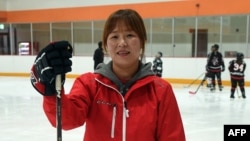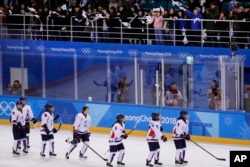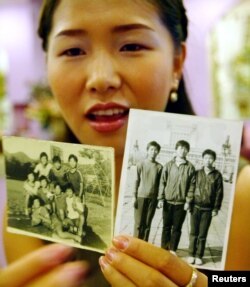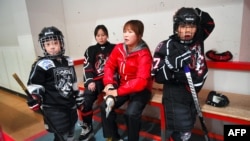A North Korean women’s ice hockey player who defected in 1997 was flooded with memories of her tough sports training as she watched a team from North and South Korea skate through their Olympic matches earlier this month.
Speaking with VOA Korea after the team’s fifth and final loss earlier this week, Hwangbo Young lauded the effort it took the blended team to come together to play as a single force, given that they began practicing together less than a month before the Pyeongchang Winter Olympics.
“I sensed that the team wasn’t able to fully demonstrate what the players prepared,” Hwangbo said. “I heard that during practice, the North Korean players were visibly very zealous and wanted to learn from the South Korean players.”
Neither the North Korean nor the South Korean team was a serious medal contender, but Hwangbo said the combined team did better than expected in matches, which ended Tuesday.
“I thought they would lose all games by double digits,” Hwangbo told VOA during an interview in Seoul after the team’s final loss on Tuesday. “But they did better than I first expected, although they lost all matches.”
Overcoming differences
For the first time in Olympic history, the two divided Koreas fielded a joint women’s ice hockey team with 23 players from the South and 12 from the North. The move was seen as a peace initiative led by South Korean President Moon Jae-in.
North Korea and South Korea split after Japan, which occupied Korea, surrendered to end World War II.
Although Hwangbo hopes to see her relatives and friends who remain in North Korea, she doubts if unification will occur in her lifetime and doesn’t expect that to change because of the united hockey team.
She pointed out that despite a similar, earlier effort — the united table tennis team of South Korean Hyun Jung-hwa and North Korean Li Pun Hui that played in the 1991 World Championship in Chiba, Japan — there are still two Koreas.
At the rink, melding the teams meant overcoming differences in training and approaches to diet, and building team spirit. Off the rink, there was criticism that sports was being used as a political tool.
“With everything that happened to them, prior to the Olympics, for them to come together like this and compete like this in the Olympics, it’s remarkable,” Sarah Murray, the Canadian who coached the South Koreans, and then the joint team.
Now coaching in South Korea, Hwangbo watched the games, which evoked memories of her training in North Korea. After her family’s defection two decades ago, she also competed against the North Korean team in the 2003 Aomori Asian Winter Games as a South Korean player.
Her training in North Korea was tough, Hwangho recalled, very tough. There were long runs with weights, there were runs in the mountains — but there were no ice rinks.
“Unless water was poured over frozen ground to freeze into ice in the wintertime, we had to do all our tactical training on bare ground with soccer balls, volleyballs and basketballs,” she said.
Start in hockey
Hwangbo, the daughter of two government workers, started playing hockey as a 12-year-old and was recruited by a coach from the North Korean national team.
“At the time, I didn’t know what ice hockey was,” she said. “I just began because I liked sports. During gym class in school, a coach asked if I wanted to play in an ice hockey team. I said ‘yes’ without knowing what it was, because I liked playing sports. Later, I found out I said yes to ice hockey.”
In 1997, Hwangbo and her family boarded a small boat and crossed the Tuman River, North Korea’s northern border, into China before settling in South Korea.
Three years after her defection, she began playing for South Korea’s national ice hockey team and became a member of the team that played against the North Korean team in the 2003 Aomori Asian Winter Games in Japan. North Korea finished fourth and South Korea fifth.
Hwangbo has said that facing the North Korean team in Aomori was one of the most painful experiences of her life.
The initial excitement of seeing some of her former teammates after seven years dissipated as they taunted her as a traitor throughout the game, even hurling insults when she approached them for a handshake after the game.
But she said she understood their antagonism, because any signs of warmth toward her could have resulted in severe punishment when the team returned to North Korea.







